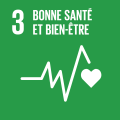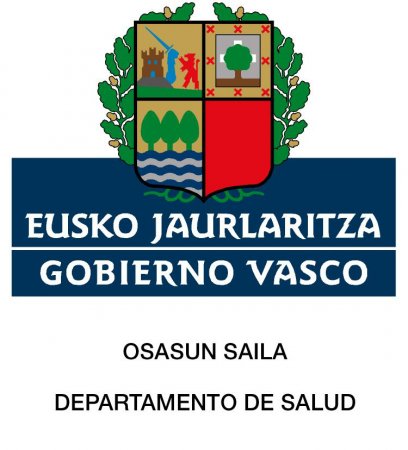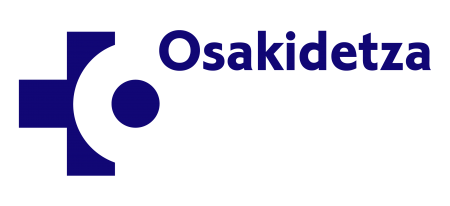
Breaking our links with antibiotic resistant bacteria
Effect of pollutants, climate change and exceeding planetary boundaries on resistant bacteria and how to use science, economics, communication and governance to find solutions.
Description
Human health is inextricably linked to the health of the planet we live on. For years, the scientific community has emphasised that environmental problems (e.g. air, water and soil pollution; noise pollution; contamination of our food; climate change; etc.) have an adverse negative impact on people's health, being, in fact, directly or indirectly responsible for millions of deaths per year globally, as well as for numerous diseases of major concern (e.g. cancer, asthma, allergies, growth disorders, hearing disorders, etc.). In this regard, the COVID-19 pandemic has starkly shown us that the progressive degradation to which we are subjecting our planet (to its biodiversity, the structure and functioning of its ecosystems, its energy balance, etc.) increases the risk of the emergence and spread of pandemics caused by infectious agents. In the case of the problem of the increase in infections caused by antibiotic-resistant bacteria, in addition to the solutions that may be provided by scientific-experimental disciplines, it is necessary to apply other disciplines such as economics, anthropology, philosophy, ethics, communication and education, among others.
This Summer Course will emphasize the links between the degradation of our planet, currently facing a global change of anthropogenic origin that is diminishing at an alarming rate our quality of life and well-being, and the health of the people who inhabit it, in order to amplify our level of environmental awareness and, above all, commitment to the protection of this Earth that welcomes us. The course also offers a vision of the problem and the search for solutions from different economic and governance strategies and will also focus on the power of communication aimed at provoking action in the face of the serious problem of antibiotic resistance.
Objectives
To communicate the magnitude of the problem of antibiotic resistance to the general public.
To provide students with training on the different aspects of the problem of antibiotic resistance in a way that is easy to understand.
To show the different lines of action and the solutions that can be generated from the different scientific disciplines.
To encourage students to act in order to collaborate in the solution of the problem of antibiotic resistance in their fields of action.
Activity directed to
- All public
- University student
- Students not from university
- Teachers
- Professionals
Program
11-07-2024
Presentation by the Director of the activity
- Itziar Alkorta Calvo | UPV/EHU - Profesora Departamento Bioquímica y Biología Molecular
“Vínculos bacterianos a través de la transferencia horizontal de genes – Bacterial links through horizontal gene transfer “
- Itziar Alkorta Calvo | UPV/EHU - Profesora Departamento Bioquímica y Biología Molecular
“Vínculos entre contaminantes emergentes químicos y la resistencia a los antibióticos “
- Néstor Etxebarria Loizate | UPV/EHU - Catedrático Departamento Química Analítica, PiE
“Vínculos entre la plastisfera y la resistencia a los antibióticos“
- Manu Soto López | UPV/EHU - Catedrático Departamento ZOOLOGIA Y BIOLOGIA CELULAR ANIMAL, PiE
Break
“Links between economy and antibiotic resistance “
- Olof Lindahl | Uppsala University - Project coordinator Uppsala Antibiotic Center
“Links between science communication and antibiotic resistance “
- Eva Garmendia Espinosa | Uppsala University - Project coordinator Uppsala Antibiotic Center
12-07-2024
“Vinculos entre el cambio climático y la resistencia a los antibióticos – Links between climate change and antibiotic resistance “
- Aline Chiabai | BC3 Basque Centre for Climate Change - Ikerbasque Research Professor
“Vínculos entre el entorno hospitalario y la resistencia a los antibióticos – Links between hospital settings and antibiotic resistance “
- Lucía Gallego Andrés | UPV/EHU - Profesora Departamento:INMUNOLOGIA, MICROBIOLOGIA Y PARASITOLOGIA
“Vínculos entre los límites planetarios y la resistencia a los antibióticos “
- Carlos Ander Garbisu Crespo | Neiker - Director Científico
Break
“Vínculos entre gobernanza coevolutiva y la resistencia a los antibióticos - Links between coevolutionary governance and Antibiotic resistance “
- Peter Søgaard Jørgensen | Uppsala University - Deputy Executive Director, Theme leader (Global Economic Dynamics and the Biosphere)
Round table: “Rompiendo los vínculos – Breaking the links“
- Lucía Gallego Andrés | UPV/EHU - Profesora
- Néstor Etxebarria Loizate | UPV/EHU - Catedrático
- Manu Soto López | UPV/EHU - Subdirector PiE
- Itziar Alkorta Calvo | UPV/EHU - Profesora
Synthesis
Directors

Itziar Alkorta Calvo
Universidad del País Vasco, Titular de Universidad
Itziar Alkorta, degree in Chemistry and Biochemistry PhD (UPV/EHU). She did a postdoctoral stay at the University of California, Berkeley. Currently, she is a lecturer in Biochemistry and Molecular Biology Dept, UPV/EHU. She directs a research group focused on understanding the molecular mechanism of bacterial conjugation to provide solutions to the problem of the spread of antibiotic resistance among bacteria. She has supervised numerous doctoral theses, master thesis and graduate works. Shee has written nearly 120 scientific and science dissemination articles, and she has led and participated in numerous research projects. She has been director of the Biofisika Institute (UPV/EHU, CSIC), Vice-Dean of the Faculty of Science and Technology and member of the Board Committee of the Spanish Society of Biochemistry and Molecular Biology. Since 2017 she is a member of AKADEME II. Currently, she is the coordinator of the Joint Research Laboratory on Environmental Antibiotic Resistance and the Director of the General Research Services (SGIker) of the UPV/EHU.
Speakers

Itziar Alkorta Calvo
Universidad del País Vasco, Titular de Universidad
Itziar Alkorta, degree in Chemistry and Biochemistry PhD (UPV/EHU). She did a postdoctoral stay at the University of California, Berkeley. Currently, she is a lecturer in Biochemistry and Molecular Biology Dept, UPV/EHU. She directs a research group focused on understanding the molecular mechanism of bacterial conjugation to provide solutions to the problem of the spread of antibiotic resistance among bacteria. She has supervised numerous doctoral theses, master thesis and graduate works. Shee has written nearly 120 scientific and science dissemination articles, and she has led and participated in numerous research projects. She has been director of the Biofisika Institute (UPV/EHU, CSIC), Vice-Dean of the Faculty of Science and Technology and member of the Board Committee of the Spanish Society of Biochemistry and Molecular Biology. Since 2017 she is a member of AKADEME II. Currently, she is the coordinator of the Joint Research Laboratory on Environmental Antibiotic Resistance and the Director of the General Research Services (SGIker) of the UPV/EHU.

Aline Chiabai
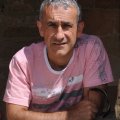
Néstor Etxebarria Loizate
Nestor Etxebarria, Professor at Analytical Chemistry Dept (UPV/EHU) and member of the IBeA Group, one of the groups supporting the Plentzia Marine Station (PiE). Currently our research is focused on the analysis of organic microcontaminants and ecotoxicology. Since 2014, in PiE our activities are focused in marine environment. We develop nontarget analytical methods for application in environmental and ecotoxicological issues. We collaborate with research groups of the Basque Country, Spain and Europe. We are part of the Joint Research Laboratory on Environmental Antibiotic Resistance. I am co-author of 195 international publications and 4 textbooks of chemistry and analytical chemistry in Basque. I was PI of projects of the Spanish Ministry, I have also participated in an H2020 project (2016-19), and recently BlueAdapt EU project (in call HORIZON-HLTH-2021-ENVHLTH-02) has been approved. I have supervised 15 PhDs and more than 25 master theses. I was the Head of the Department of Analytical Chemistry at the UPV/EHU (2011-2019). Currently, I am member of the academic board of the Erasmus Mundus Master on Marine Environment and since May 2020, I am the coordinator of the Master on Environmental Contamination and Toxicology UPV/EHU

Lucía Gallego Andrés
Universidad del País Vasco UPV/EHU
Lucía Gallego, Graduated in Medicine and Surgery, Master in Recombinant DNA Technology, PhD in Medicine and Surgery. Prof. of Medical Microbiology, Faculty of Medicine & Nursing, University of the Basque Country UPV/EHU. Representative of the Faculty of Medicine & Nursing in the National Plan Against Antibiotic Resistance (PRAN) of the Spanish Agency of Medicines and Health Products (AEMPS). Head of the Acinetobacter baumannii Research Group working on the study of antibiotic resistance and its dissemination through mobile genetic elements among clinical isolates causing serious hospital-acquired infections that have become a worldwide threat as multidrug-resistant isolates have dramatically risen worldwide. Collaborations with international groups from Germany, Egypt, Bolivia and UK, Author of 53 international publications, 9 book chapters, 79 international congress. Participation in 54 research projects, 28 as PI. Supervisor of 12 PhD, 12 MSc, 16 undergraduates, 6 OWSD mentoring
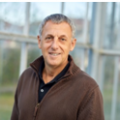
Carlos Ander Garbisu Crespo
NEIKER, Director Científico
Carlos Garbisu is the Scientific Director of NEIKER. He holds a degree in Biology from the University of the Basque Country, a Master of Science from the Imperial College of Science and Technology (London), and a PhD from King's College London. He did postdoctoral studies at the University of California at Berkeley. In 2018 he was recognised by the Basque Government for his research work. In 2019, 2020, 2021, 2022 and 2023 he was included in the "World's Most Influential Scientists" by researchers at Stanford University. He collaborates in several master's degrees where he focuses his teaching on soil microbiology. He investigates on the use of microbial ecology tools to assess the impact of disturbances on soil sustainability, as well as to monitor the effectiveness of biological remediation processes. He has 187 articles in the Scopus database, with an h-index = 55. He collaborates as an expert in the United Nations Harmony with Nature Network.
Eva is a coordinator and communicator at Uppsala University, experienced in management and communications, and specializing in antibiotic resistance. She is a former microbiology researcher with a strong interest in science communication, network building, and facilitation within science. She has worked on genetics and evolution at the University of Granada, the Spanish Research Council, and the Uppsala University (Ph.D. in Medical Sciences on bacterial evolution). She currently works at the Uppsala Antibiotic Center, taking care of the overall project management, content creation, communication, and networking, and also supports the communications efforts of PLATINEA (Platform of Innovation of Existing Antibiotics). Having a passion for science communication, she works producing the center’s podcast and organizing the center’s outreach activities. Her role as a communicator also involves managing social media accounts, websites, and media content, as well as taking care of the flow of information within the organizations and toward extended networks. Additionally, she has recently joined Rx Dynamics, a diagnostics start-up company, as their part-time Chief Operational Officer.

Olof Lindahl
Dr. Olof Lindahl is an Associate Professor in International Business and works at the Department of Business Studies at Uppsala University. Lindahl is also a member of the management team at the Uppsala Antibiotic Center. His research interests concern: - Innovation in the antibiotic industry, particularly in relation to economic policy interventions in firms’ new economic models to incentivize innovation in antibiotics. - Technology transfer - international diffusion of diagnostic tools for bacterial infections. - Policy interventions to tie incentives for antibiotic R&D to models ensuring the responsible use of new drugs. Presently, Lindahl is the leader of ‘iDX: An Exploration of Regulatory, Corporate, Relational, and Technical Barriers to Supply and Global Use of Diagnostics in the Fight Against AMR’ funded by the JPIAMR. This multidisciplinary consortium involves partners from Uppsala University, University of Cape Town, Karolinska Institute, Université Laval and the BEAM Alliance.

Peter Søgaard Jørgensen
Peter holds a PhD in ecology and evolutionary biology from 2014. His work studies the intersection of sustainable development and (re-)emerging infectious diseases with a special focus on antibiotic resistance. Since 2019, he leads the research group on global health at the Global Economic Dynamics and the Biosphere programme at the Royal Swedish Academy of Sciences and is theme leader of Anthropocene Dynamics at the sustainability science hub Stockholm Resilience Centre at Stockholm University and is affiliated with the Uppsala Antibiotic Centre at Uppsala University. He is currently the PI of an ERC starting grant INFLUX – Emerging pests and pathogens as a novel lens for unravelling social-ecological cascades (2022-2027) and has led two successful international consortia on the links between AMR and sustainable development. His work has been featured in Nature, Science, PNAS and the Lancet Infectious Diseases.

Manu Soto López
Professor of Cell Biology (UPV/ EHU, 2011). Deputy Director Plentzia Marine Station (2012-). Researcher in the Consolidated Research Group Cell Biology in Environmental Toxicology. Pre and postdoctoral research studies in: U Wales (Aberystwyth, Cardiff), U Innsbruck, U Azores. He has supervised 9 PhDs (+ 3). Interests on the development and application of biomarkers of effect against exposure to metals in aquatic and terrestrial organisms (earthworms, molluscs, polychaetes, fishes), cellular localization and quantification of metal ions, transit of metals (aqueous forms, massive forms and nanoparticles), plastics, antibiotics, etc. Responsible of the stranced cetaceans network in Euskadi. >125 papers (>85% in Q1; H Index= 32), and >300 contributions at conferences. PI of research projects funded by the Spanish Ministry, UPV/EHU, Basque Government and contracts. Participant >20 years in European research projects. Evaluator for Agencies (Spanish, Portuguese, UK, Argentina). Founding Member of the Latin American Society of Environmental Contamination & Toxicology. Vicedean of FCT/ZTF (2007-2012), Coordinator of Master MER (2012-), Member of Committee: Ethics and Animal Welfare (2009-12).
Registration fees
| Face-to-face | Until 31-05-2024 | Until 11-07-2024 |
|---|---|---|
| 25,00 EUR | 59,00 EUR | |
| - | 84,00 EUR | |
| - | 71,00 EUR | |
| - | 59,00 EUR | |
| - | 21,00 EUR | |
| - | 0 EUR |
| Live online | Until 31-05-2024 | Until 11-07-2024 |
|---|---|---|
| 25,00 EUR | 59,00 EUR | |
| - | 84,00 EUR | |
| - | 71,00 EUR | |
| - | 59,00 EUR | |
| - | 21,00 EUR | |
| - | 0 EUR |
Venue
PiE-UPV/EHU (Plentzia Marine Station)
Areatza Pasealekua. 48620 Plentzia
Bizkaia
Sustainable development goals
Agenda 2030 is the new international development agenda approved in September 2015 by the United Nations. This agenda aims to be an instrument to favour sustainable human development all over the planet, and its main pillars are the eradication of poverty, a reduction in equality and vulnerability and fostering sustainability. It is a unique opportunity to transform the world up to 2030 and guarantee human rights for all.

3 - Good health and well-being
Guarantee a healthy life and foster the well-being of all people of all ages. Key issues: universal healthcare coverage, sexual and reproductive health, reduction in the number of road accident casualties, pollution and chemical products, reduction in maternal and neonatal mortality, the end of epidemics such as AIDS, combating hepatitis and other water-borne diseases, drug and alcohol prevention, control of tobacco.
More information